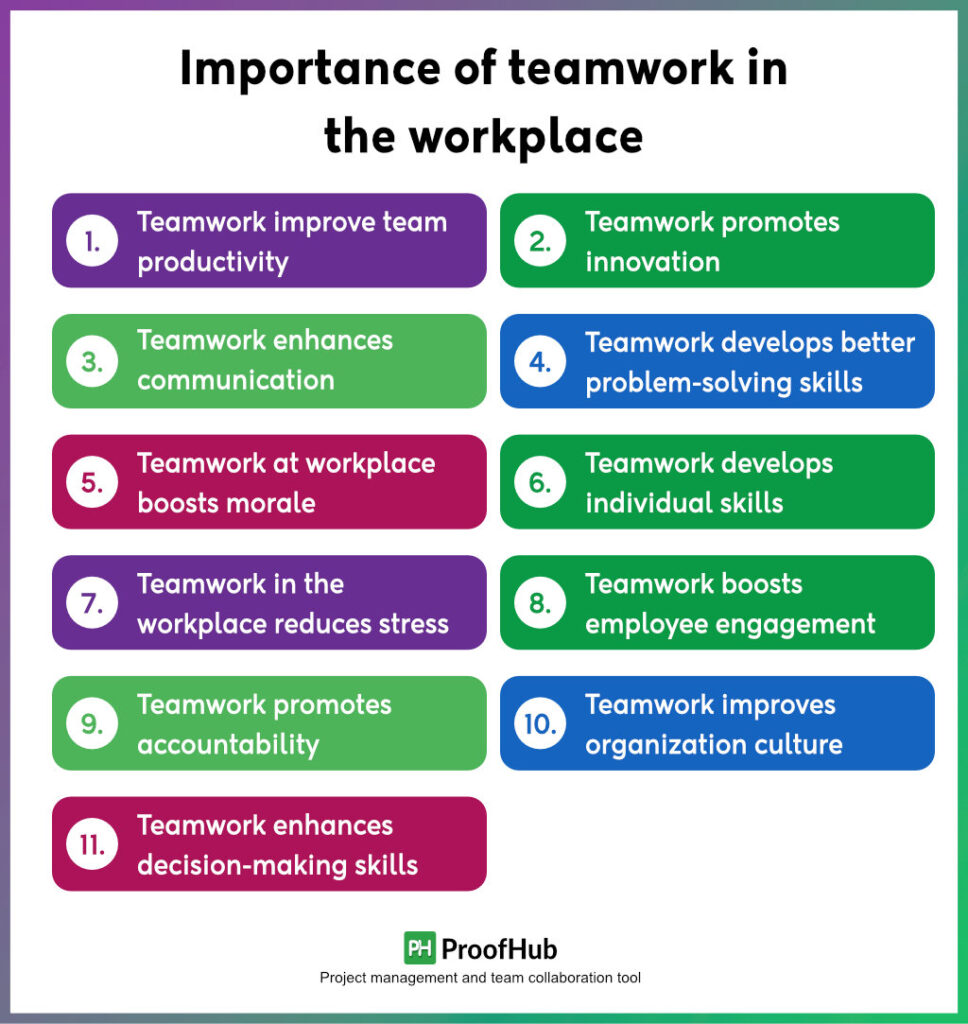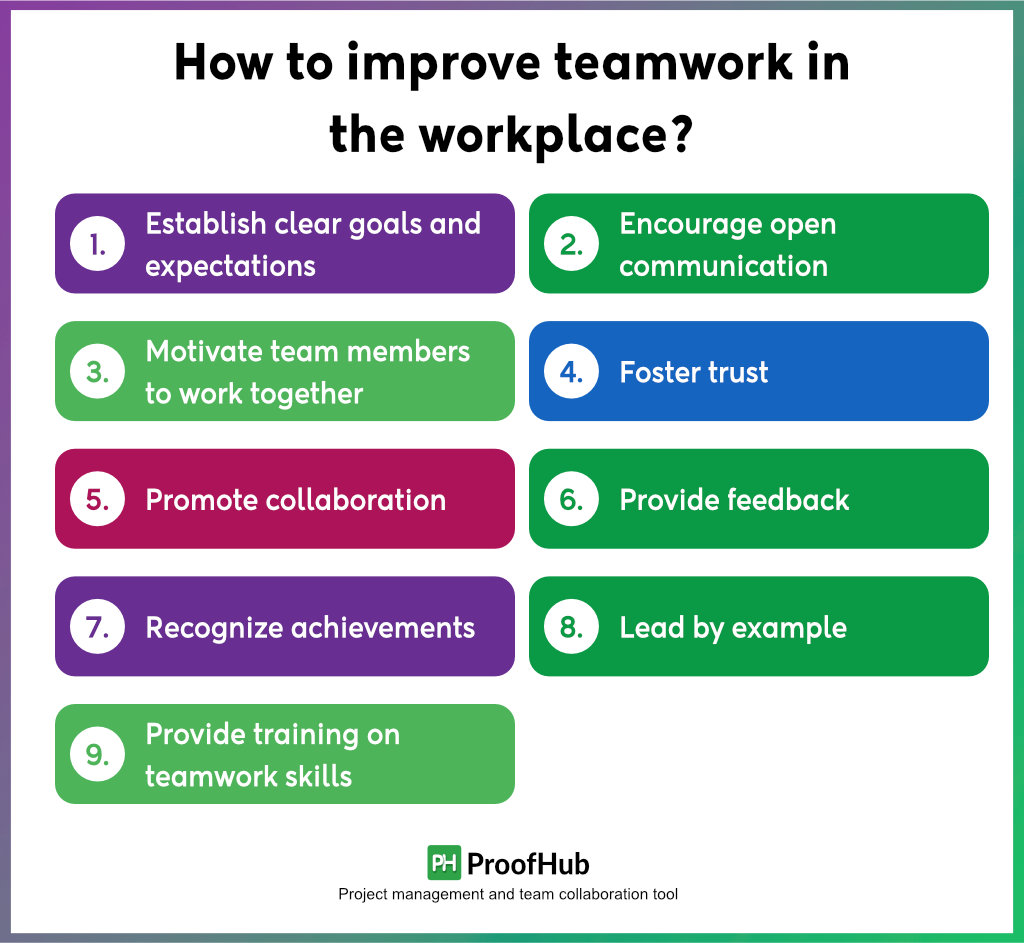Introduction
Teamwork is an essential component of success in every organization. When people work together effectively, they can achieve amazing results that no one person could accomplish individually. The importance of teamwork in the workplace cannot be ignored since it promotes employee productivity, creativity, and satisfaction among employees.
Steve Jobs once said, “Great things in business are never done by one person. They’re done by a team of people.”
In this post, let’s explore the importance of teamwork in the workplace, its benefits, examples of teamwork, and how to improve it.
What is teamwork in the workplace?
“Teamwork is the ability to work together toward a common vision. The ability to direct individual accomplishments toward organizational objectives. It is the fuel that allows common people to attain uncommon results.” – Andrew Carnegie
When you see multiple individuals working together efficiently to achieve a common goal, you are witnessing teamwork in action.
By working together, team members can accomplish more than they ever could alone. They can also develop innovative solutions to complex problems that would be impossible to solve on their own.
In a team, every member brings a unique skill set to the table, complementing each other’s strengths and compensating for their weaknesses. This makes the team more well-rounded and effective, capable of tackling even the most challenging tasks and projects.
Why is teamwork important in the workplace?
Here are the 11 most notable teamwork benefits, including relatable teamwork in the workplace examples to help you understand the importance of teamwork in the workplace.

1. Teamwork improves team productivity
When team members work together effectively, it allows you as a manager to identify each member’s strengths and weaknesses, and assign tasks accordingly.
This not only leads to more efficient and timely completion of projects but also creates an environment where everyone feels valued and respected.
Moreover, teamwork encourages open communication and fosters trust and respect among colleagues. It creates a positive working environment. All these factors contribute to increased productivity.
Example: Ryan and Emma are working together on a project. Ryan is great at coding but struggles with organization, while Emma excels at planning but sometimes lacks coding expertise.
By combining their strengths, they were able to complete the project ahead of schedule with fewer errors.
Quick tip: Use a goal-setting and planning tool to effectively align tasks with objectives, ensuring steady progress and keeping team members on track every step of the way. Also, try to have one-to-one checks to manage disorganized team members.
2. Teamwork promotes innovation
Employees can brainstorm new ideas while working together to complete a new task. They build on each other’s ideas to create something great.
Teamwork not only fosters creativity but also encourages risk-taking and experimentation. Team members feel more confident in trying out new approaches with the support of their work teams.
By working together, teams can come up with solutions that would never have been possible by working alone.
Example: Ryan is a data analysis expert, and Emma is a creative designer. They teamed up on a project to enhance a product’s user experience.
At first, they didn’t agree on everything, but they learned that working together was way better than working alone. Ryan’s data insights informed Emma’s creative ideas, resulting in a workplace synergy that produced innovative solutions.
To their surprise, they were able to improve the product’s user experience more than they originally expected.
Quick tip: Hold group discussions between team members. Also, you can organize brainstorming exercises such as brainwriting and freestorming to produce powerful ideas and deliver excellence.
3. Teamwork enhances communication
When people work together in a team, they are more likely to share their thoughts and ideas. This leads to more open and frequent communication, which can help team members better understand each other’s perspectives and work more efficiently toward achieving their objectives.
Moreover, working together can make team communications more engaging, as team members can bounce ideas and brainstorm new solutions together. This creates a sense of shared ownership and responsibility, which can foster a more collaborative and productive work environment.
Example: Ryan, Emma, and Holly were working together on a project with a tight deadline. Ryan focused on research, Emma on design, and Holly on client relations. However, due to poor communication, they faced delays and overlapping tasks in the beginning.
But they didn’t give up. They recognized their teamwork issues, and instead of pointing fingers, they brainstormed a solution. They decided to have a daily huddle where Ryan would share progress, Emma would highlight design changes, and Holly would update on client feedback.
This quick and focused communication helped them to coordinate better and avoid overlaps.
Quick tip: Improve communication by keeping tasks and workflow in a shared digital space. That way, everyone can stay on the same page, regardless of where they are.
4. Teamwork develops better problem-solving skills
Working in a team setting provides an opportunity for individuals to learn from each other and develop better problem-solving skills.
By collaborating with others, team members gain exposure to different brainstorming techniques, and expand their knowledge base.
As a result, working in a team setting can lead to more robust solutions to complex problems.
Example: Ryan, Emma, and Holly were part of cross-functional teams assigned to streamline a company’s internal processes.
As they delved into the project, they encountered bottlenecks and inefficiencies. Ryan’s data analysis revealed the root causes, Emma envisioned creative solutions, and Emily facilitated communication among team members and various departments.
Through this collaborative problem-solving journey, Ryan, Emma, and Emily improved internal processes and developed problem-solving skills that extended beyond the project.
Quick tip: Problem-solving as a group can be improved through team-building activities that boost confidence in solutions.
5. Teamwork at the workplace boosts morale
Working together as a team has a significant impact on the morale of individuals at work. It fosters a sense of unity and belonging, making them feel like they are part of something bigger.
In addition, when colleagues share their skills and knowledge, everyone benefits and can grow professionally.
By reducing stress and workload, teamwork can lead to a better work-life balance and a more positive workplace culture. In short, teamwork boosts morale and creates a productive and engaged workforce.
Example: Emma and Ryan teamed up to create a campaign for their new product launch. Despite tight deadlines and creative challenges, their teamwork turned the project into a morale-boosting experience.
They held joint brainstorming sessions, organized team lunches, and small celebrations for achieving project milestones, creating an atmosphere of mutual support.
Their teamwork not only produced a successful campaign but also had a significant impact on the overall morale of the workplace.
Quick tip: Motivate your team by giving feedback, recognition, professional growth, and meaningful purpose.
6. Teamwork develops individual skills
When working as part of a team, individuals have the opportunity to develop a wide range of skills.
Collaborating with others can help team members learn new techniques for problem-solving, communication, and time management. It also encourages individuals to share their knowledge and expertise, which can lead to new insights and approaches to handling tasks.
Ultimately, teamwork can help individuals develop both personally and professionally, while also contributing to the overall success of the team.
Example: When Holly and Ryan teamed up to streamline a customer support process, they discovered the potential for mutual skill development.
Holly learned the importance of customer-centric thinking from Ryan, while Ryan learned problem-solving techniques from Holly.
Their teamwork not only streamlined the workflow but also contributed to their individual skill development.
Quick tip: If a team member can complete a task just as well as you, delegate it. This allows them to grow their strengths and skills.
7. Teamwork in the workplace reduces stress
When employees collaborate, they share the workload, which can lead to a more balanced and manageable workload for everyone involved. This can help reduce the feeling of being overwhelmed and stressed out.
Additionally, teamwork fosters support, idea exchange, and camaraderie, which helps to reduce feelings of isolation and nurtures a positive work environment.
All of these factors combined can significantly reduce stress levels and promote overall well-being.
Example: Emma and Ryan teamed up to launch a new mobile app for their company. Emma shared her technical insights with Ryan, while Ryan provided market updates to fine-tune the app.
Together, they created a high-quality product and an enjoyable work experience. By collaborating, they not only achieved a successful launch but also reduced the stress of their respective tasks.
Quick tip: When employees feel comfortable with each other, work becomes less stressful. As team members get to know each other, communication barriers are broken down, making future interactions easier.
8. Teamwork boosts employee engagement
When you feel like you are part of a team, you’re more likely to be invested in the work you are doing. This sense of belonging can help you stay engaged and focused on your tasks.
Plus, when you work with others, you can learn from each other and grow professionally. By communicating effectively and supporting each other, you can complete your tasks and projects more effectively.
This shared success can be incredibly rewarding and lead to even higher levels of engagement.
Example: Emma and Ryan were initially from different teams at work but were assigned to work together on a project. They realized that they made a great team and came up with some great concepts.
As they continued to work together, they started to build a sense of trust and respect for each other. And their project turns out to be a huge success.
Quick tip: Engage your team members during team meetings by asking questions. This keeps them active and interested and can be done formally or informally.
9. Teamwork promotes accountability
By working together, team members can hold each other accountable for their actions, which can help prevent burnout and ensure that everyone is doing their part.
When team members are held accountable and feel supported by their colleagues, they are more likely to stay motivated and engaged in their work.
Example: Emma and Ryan struggled with their project and blamed each other. They later took accountability, set clear goals, communicated better, and completed the project successfully.
This boosted their performance and strengthened their trust in each other and finished the project efficiently.
Quick tip: Simplify project management by getting everyone on the same page with a single team management software. With this approach, your team members can see who is responsible for what, making it easier to achieve your goals.
10. Teamwork improves organizational culture
By promoting open communication, working as a team can create a more positive and supportive work environment.
When team members work together towards common goals, they feel more connected to each other and the bigger objective of the organization.
This sense of unity can create a stronger and more cohesive teamwork organization.
Example: Emma and Ryan were both managers at a company that was struggling to maintain a positive work culture. Emma suggested organizing team-building activities and promoting open communication between departments.
Ryan proposed offering professional development opportunities to employees and implementing a flexible work schedule. By combining their ideas and working together, they successfully created a more positive and collaborative work environment.
Quick tip: Encouraging team members to share their values and finding common ground will lead to a more productive and fulfilling work environment.
11. Teamwork enhances decision-making skills
By working together and sharing ideas, team members can make more informed and effective decisions.
When team members collaborate and communicate openly, they can consider different perspectives and come up with creative solutions to problems, fostering a strong sense of team building and cohesion.
Additionally, teamwork can help with work allocation, as team members can draw on each other’s strengths and skills to ensure that tasks are assigned to the most qualified person.
Example: Emma and Ryan, both managers at a marketing firm, collaborated on a project and benefited from each other’s strengths.
Emma brought analytical skills while Ryan was creative. They developed an effective marketing campaign for their client by leveraging their abilities and working together efficiently.
Quick tip: Invite team members to participate in important meetings and present their solutions actively. This can help team members feel more confident to share their thoughts in front of other team members. As a leader, try to improve your leadership skills constantly to build a strong team.
How to improve teamwork in the workplace?
Being a team manager isn’t just about overseeing tasks. It creates a positive work environment, promoting cooperation, and fostering a sense of camaraderie among team members. To do so, you need to improve teamwork in the workplace and promote it.
Here are nine actions you can take to improve teamwork among your team members.

1. Establish clear goals and expectations
Your team members must have a clear understanding of their responsibilities and how their efforts contribute to the overall success of the team.
As a manager, you have to ensure that everyone is on the same page and working towards the same objectives.
2. Encourage open communication
As a team manager, it is important to create an environment where working expectations are clear and team members feel comfortable sharing their ideas, thoughts, and concerns.
Encourage open and honest communication among team members to ensure coordination and a smooth workflow.
3. Motivate team members to work together
You can improve the working relationships of team members by implementing team-building activities.
You can include activities such as assigning group projects, hosting frequent and effective team meetings, or arranging social events outside of work.
These initiatives can help create a more cohesive and productive working environment.
4. Foster trust
Create a culture of openness and honesty within your team to foster trust and cooperation.
Encourage team members to rely on each other’s unique contributions and expertise, while recognizing and addressing dependencies within the team.
Building trust through transparency is key to creating a successful and high-performing team.
5. Promote collaboration
As a team manager, you can boost your team’s performance by fostering a culture of collaboration.
Motivate your team members to work together, share knowledge, and collaborate on projects. Provide opportunities for them to team up on projects and achieve success together.
6. Provide feedback
As a team leader, try to provide your team members with constructive feedback that can help them improve their skills and performance.
Encouraging team members to provide feedback to each other on their deliverables can also be beneficial. By doing so, you can help your team members achieve their goals and improve their overall productivity.
7. Recognize achievements
As a team manager, it is important to acknowledge the hard work and achievements of your team members.
Showing appreciation can come in many forms, such as public recognition, bonuses, or other forms of praise.
Letting your team know that their efforts are valued can boost morale and motivate them to continue to do their best.
8. Lead by example
As Barbara Corcoran said, “People imitate their leader. Lead by example.”
Show your team members the importance of teamwork by embodying these values yourself.
By modeling the behavior you want to see in your team, you can create a culture of teamwork within your organization.
9. Provide training on teamwork skills
As a team manager, you understand the importance of building a strong and cohesive team.
That’s why it is crucial to provide training on essential teamwork skills, such as effective communication, conflict resolution, and problem-solving.
Conclusion: embracing the power of teamwork
To make a long story short, teamwork is crucial for achieving success in any workplace. Prioritize open communication, clear goal-setting, and utilize communication tools to connect diverse talents and ideas.
Consider using work management software to take teamwork to the next level. Work management software like ProofHub will let your team work together and reduce chaos by providing a centralized platform.
ProofHub is a comprehensive work management and team collaboration tool that lets you manage and organize your projects, teamwork, and communication in one place.
With ProofHub, you can collaborate with your team members in real time without missing any information. Its feature-rich platform can help you stay on top of work, improve productivity, and let you work with ease.
Related articles
- How to build a team: Strategies, importance and challenges
- A manager’s guide to team management
- Cross-functional teams: The future of corporate teamwork
- How to manage a growing team? 8 effective tips
- 18 team management software to keep your teams productive and organized
FAQs
How to become more efficient in a team at work?
You can become more efficient in a team at work by leveraging individual strengths, promoting open communication, and utilizing advanced work management tools, teamwork can significantly enhance team efficiency.
What are the qualities of good teamwork?
Good teamwork involves open communication, mutual respect, a shared vision, and the ability to leverage diverse strengths for collective success.
What are the principles of teamwork?
The principles of teamwork include trust, effective communication, recognizing individual strengths, and fostering a positive team culture.
What are some challenges and problems of teamwork in the workplace?
Common challenges include miscommunication, lack of clarity, and difficulties in integrating diverse perspectives. These can be mitigated through clear expectations and open communication.

